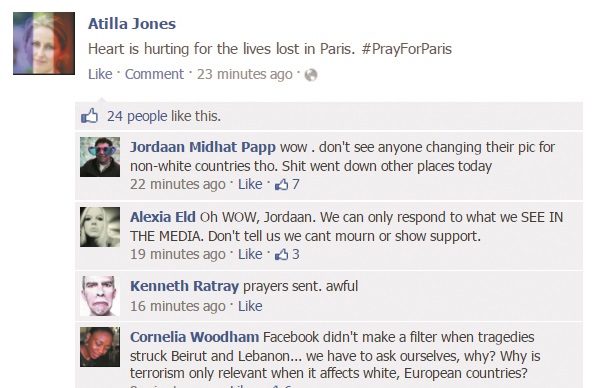Facebook’s French Flag Filter
After the recent terrorist attacks in Paris, Facebook offered a temporary filter to add to one’s profile picture, a sheer image of the French flag. If my timeline is a microcosm of the typical American timeline, many users seized this opportunity.
But after the filter came the fallout.
Some users were upset that the French flag was the only filter to be offered, when in fact ISIS has murdered civilians in multiple countries, most notably Beirut, Lebanon, and Mali. This was used to support the claim that Americans only care about developed European nations and are indifferent towards the plights of poorer Middle Eastern and African nations. I saw one particular user change his profile picture to an American flag, sarcastically stating that “the only country Americans truly care about is their own.”
Other users claimed that the filter was just a lazy way for Americans to convince themselves that they were affecting real change, while low-voter turnout and political ambivalence continues to plague the nation. The words “armchair activism” and “slacktivism” were thrown around, using similar social media trends (for example, the ALS ice bucket challenge) as further examples.
Those who did utilize the filter lashed back. They claimed there was no harm in making a small statement in support of a shocked and grieving nation. They lamented the “controversializing” of a completely innocuous feature and expressed anger at those seeking to shame them for a benevolent act.
As a Facebook user, the filter was offered to me. The message stated something along the lines of “show your support for Paris with this temporary profile filter.” But instead of automatically clicking “Try it Out” I stopped to consider the controversy. I asked myself a series of questions before proceeding:
DO I “SUPPORT” FRANCE?
As this was the justification offered by Facebook for the filter, I considered the meaning of the word. I empathized with the citizens of Paris, of course, but to “support” is an entirely different verb with a different meaning. What exactly would I be supporting? I concluded that I would be showing support for the retaliatory measures France was surely about to take against ISIS.
WHY IS FRANCE PARTICULARLY IMPORTANT TO ME?
I was aware that ISIS had wreaked havoc in many other countries, so I asked myself why France was particularly important to me. Would I be willing to change my profile picture to the flag of other nations? If so, what qualified as an important enough tragedy for me to change my picture? And if I did change my picture, how long would I leave it up? Would I wait until the issue was no longer front-page news, until another tragedy eclipsed the current one, or until Facebook simply retired the filter?
AM I AFFECTING CHANGE?
Was there someone out there who would feel comforted by seeing my profile picture change? Was I sending a message that might affect the way someone viewed or felt about France or ISIS? Or was change not the point, the filter simply being a way to acknowledge the tragedy without commenting on it?
In the end, I decided not to change my profile picture. I felt that the message it sent was too ambiguous. Instead, I posted a picture of the painting The Surrender of General Cornwallis by John Trumbull. I realized that I cared about France in particular because I knew (from watching Roland Emmerich’s The Patriot) that they had helped the United States win the American Revolution by preventing General Cornwallis from retreating by sea. I wanted to remind others that France had helped us win our war and we might need to support them if they now entered a war of their own.
The Facebook filter did not offend me and I have no grievance with those who used it. But I would suggest considering the message you want to send and assess if that message is getting across. Don’t let Facebook decide what you care about, why you care, and for how long it will matter.






